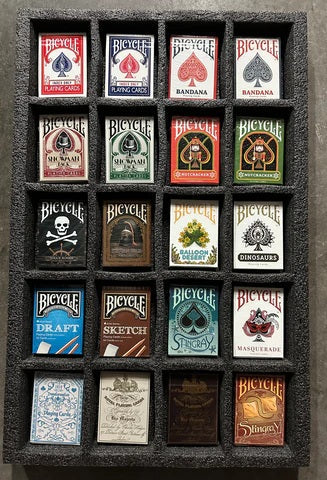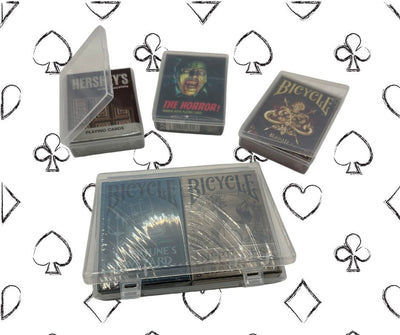Almost everyone is familiar with solitaire. Klondike is the most played game of them all, but other solitaire games like Spider, FreeCell, Golf, and Pyramid are also very well known. Besides these there are many other popular solitaire games that you'll find on solitaire apps and websites, and in books about solitaire card games.
But what about solitaire games that are quite obscure? Of course there are plenty of solitaire games out there whose obscurity is a direct result of the fact that they just aren't any good. It's no surprise in those cases that nobody wants to play them and that little is said about them. But are there some little known solitaire games that are actually quite good? I decided to go on a quest off the path well travelled in order to try to find some obscure solitaire games that are genuinely fun to play, and worth knowing about. This article is the result.
Here are one dozen different solitaire games, that you've probably never heard about before that are actually worth trying, and which I found fun to return to (unlike many which didn't make this list). They're divided into two main categories: half a dozen are builder games, the other half a dozen are non-builder games. But all of them have the distinction of being relatively unknown, and enjoyable to play.
== Builder Games ==
Ascension
Thoughts: This game has somewhat of the feel of the simple builder game Osmosis in that cards need to pass through others to get to the foundation. You can't just place cards willy-nilly, because you'll get stuck. First you'll have to ensure that the top rows allow you to pass lower valued cards through, so ideally you want to set up the top row with some threes, so that you can use these to move twos to the foundations. The Allgood Solitaire app implements a variation where empty spaces need not be filled immediately, which results in a more flexible game. In this variation, you can strive to have at least one space free in each row, because then you can move any card from the bottom row up the rows to the foundation, and with good play then you can win almost every game. Ascension is certainly a satisfying game to play, and the movement up the rows gives it a very different feel from most builder games.
Fission
Thoughts: Confused by the description? You really need to see the game in action to understand what is going on, and play the game using a program like Solitaire Forever. Fission was created by Morehead and Mott-Smith during the historic 1940s era when scientists were working to split atoms, and the theme behind this solitaire game is fascinating. Your chances of winning are actually quite high, but the order in which you play cards is important, because you have to ensure that you don't trap cards needed later in the game. Fission certainly something very, very unique, and it is also rewarding to play.
Flamboyant
Thoughts: As the name suggests, this builder game has a flamboyant look about it, but it's quite easy to play and win, although your chances of success can depend on which cards are face-down. In his book, Crepeau suggests a variant in which you play with all the cards face-up for a more strategic game, and this variant has also been implemented in the Allgood Solitaire app. Completely open information available enables you to do more planning, and then you should be able to win most games. While not a deeply strategic game, Flamboyant is different enough from the more well-known builder games to make it interesting to play as a diversion.
Four Winds
Thoughts: The restriction on replenishing spaces with cards that match the suit of the corresponding foundation results in a very enjoyable game which is challenging, and yet can mostly be won with good decision making. Typically you want to vacate spaces in the tableau, and place lower ranked cards there that can't yet be played to the foundation; higher ranked cards will clog things up and make the game nearly impossible to win. It's often a good idea to move some of the initially dealt cards if a space becomes available of the corresponding suit, freeing up spaces for different suits elsewhere in the tableau. So you'll have to plan ahead, and make good use of the four available spaces for each suit. You'll usually be able to get lower valued cards onto the foundations in the first pass through the deck, and then can comfortably finish the game during the second pass.
Labyrinth
Thoughts: The game's name originates from the gaps that get created as you play, which gives the tableau a superficial resemblance to a labyrinth. It's hard to win, especially if you don't get the 2s and 3s out early, so you need a favourable luck of the draw to have any chance of success. I've only won about 5% of the roughly hundred games I've played. But when you do start making progress in playing cards to the foundations, more and more gaps appear, opening up more opportunities, and a win is incredibly satisfying. But even a loss isn't too painful, because games only take a few minutes at most. For a two-deck game with a slightly similar feel (but without gaps), take a look at Babette, which is most satisfying when playing with relaxed rules that allow three redeals of the stock.
Roaming Proils
Thoughts: The use of three card "proils" consisting of cards of matching values is a fascinating limitation that really changes the feel of the game. Once you do have a proil of cards, it means that the remaining card of that value is stuck elsewhere in the tableau, until either you can play it to the foundations, or if you play a card from the corresponding proil to the foundations. The use of the special reserve spot for Kings is an excellent rule that prevents a bad deal of Kings blocking other essential cards. The creator of Allgood Solitaire came up with a variant he calls Open Proils where you begin the game with all cards face-up, and I agree that this is a significant improvement because then you have open information from the start. AllGood rates the odds of winning Roaming Proils as 5% and Open Proils as 15%, but I've found that I can win almost a third of my games of Open Proils if I begin with a starting layout that has the Aces and Kings favourably positioned. This has become my new favourite Fan game!
== Non-Builder Games ==
Crossword
Thoughts: The rules of this game are very simple and easy to understand, and the concept is brilliant. It really proves to be a rewarding tactical puzzle, and is more difficult than you might expect to achieve successfully. I enjoyed this creative solitaire game a lot due its unique feel. It will especially appeal to people who enjoy working with numbers. Originally published by George F. Hervey in his book Enjoying Card Games for One, Peter Arnold has published a variation that is much easier to win in his book Card Games For One, and you'll find good implementations for both in the Solitaire Forever app.
Empire
Thoughts: This is an original solitaire game created by Jim Owen, and when I first played it on BVS Solitaire I knew right away that it belonged on this list. It's an ingenious game that reminds me of the tactical elements of a game of chess, and also some of the tactical elements of more well-known non-builder games like Accordion and Royal Marriage. While it is very simple to learn, real skill is needed to get a win. Before your very first move you should assess the entire board, and figure out which cards should be the ones that you capture with. It's easy to capture cards of the same suit as you play, but eventually you want to get down to a single suit. You'll need to rely on matching values to eliminate a suit, and keeping cards of matching values in play until the latter stages can really help. Bringing in cards from the stock of the game can help or hinder your efforts, and it's wisest to bring these in during the mid-game phase.
Line Up
Thoughts: This is an extremely fun tactical challenge, that is super easy to learn, and yet can prove more tricky than you might think. The key lies in placing the Aces and 5s, since no card can be placed on the left of an Ace, and no card can be placed on the right of a 5, so you have to try to avoid situations where that happens otherwise you'll get stuck. Getting Aces into the first space of every row will give you a strong start. The fact that you can complete a game in just a couple of minutes adds to its appeal. Other abridged versions of Montana/Gaps include Four Ways, Journey, and Long Trip, all of which use 36 cards (6s through Kings) laid out in four rows of nine columns.
Mixtures
Thoughts: Pairing games tend to be simpler games, and usually require matching cards that are identical in value or that add up to a certain value. This game changes that up, which makes it immediately stand out from the many other games in this genre. Because there are thirteen different values from Ace through King, you can't always simply pair the same set of values (e.g. 1s and 2s, 3s and 4s etc), otherwise you'll be stuck with the Kings. Furthermore you are forced to work with whatever cards are in the tableau, and sometimes that will compel you to make matches you'd prefer to avoid. You can get stuck if you play without any thought, and having some sense of which values haven't yet been discarded can increase your chances of success; as can a healthy number of "undos" in the closing stages.
Rectangular Rovers
Thoughts: This works much like a traditional sliding puzzle, the most well known of which is the 15 puzzle, which has the goal of moving 15 numbered tiles into the correct sequence within a 4x4 frame. But while that only has a single space, having four spaces at the start of the game increases your options significantly. What I like about this game is how it offers a very different way of using playing cards than most other solitaire games.
Slide
Thoughts: Slide is vaguely reminiscent of the spatial and matching elements of Monte Carlo, but involves considerably more strategy and more interesting choices. It's a good strategy to try to keep cards in the game by only sliding off a card if there is one of matching value in that row. Removing sets of higher valued cards will also earn more points later in the game, since the multiplying factor is higher. Empty spaces produced by the removal of sets can also be filled directly by the stock, and creating these spaces will also prove very useful. Slide is a very unique and enjoyable solitaire game, where decisions really matter.
Final Thoughts
Most of the above games work very differently from the run-of-the-mill solitaire games that we tend to be familiar with. At the very least, you're certain to come across some very novel solitaire games here, and you may be surprised by how much fun can be had with them. Happy exploring!
Final note: You can certainly play these with an actual deck of playing cards, which is particularly satisfying with an attractive custom deck. But when it comes to learning the rules of a new solitaire game, the best way to play is with the help of a reliable software program, like the ones offered by BVS Solitaire. Their program for Windows is one of the best I've tried, and they also have excellent versions for Mac and for mobile devices.
About the writer: EndersGame is a well-known and respected reviewer of board games and playing cards. He loves card games, card magic, cardistry, and card collecting, and has reviewed several hundred boardgames and hundreds of different decks of playing cards. You can see a complete list of his game reviews here, and his playing card reviews here. He is considered an authority on playing cards and has written extensively about their design, history, and function, and has many contacts within the playing card and board game industries. You can view his previous articles about playing cards here. In his spare time he also volunteers with local youth to teach them the art of cardistry and card magic.
Last update date: 10/14/22






3 comments
I need to play fission solitaire text me back when you get this message let’s me know when you get a chance please thanks you very patiently
I need play fission solitaire games
You forgot clock solitaire. Lol